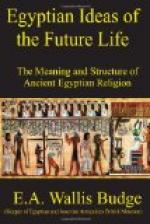From what has been said above, it will be seen that there is no reason for doubting the antiquity of the Egyptian belief in the resurrection of the dead and in immortality, and the general evidence derived both from archaeological and religious considerations supports this view. As old, however, as this belief in general is the specific belief in a spiritual body (S[=A]H or S[=A]HU); for we find it in texts of the Vth dynasty incorporated with ideas which belong to the prehistoric Egyptian in his savage or semi-savage state. One remarkable extract will prove this point. In the funeral chapters which are inscribed on the walls of the chambers and passages inside the pyramid of King Unas, who flourished at the end of the Vth dynasty, about B.C. 3300, is a passage in which the deceased king terrifies all the powers of heaven and earth because he “riseth as a soul (BA) in the form of the god who liveth upon his fathers and who maketh food of his mothers. Unas is the lord of wisdom and his mother knoweth not his name. He hath become mighty like unto the god Temu, the father who gave him birth, and after Temu gave him birth he became stronger than his father.” The king is likened unto a Bull, and he feedeth upon every god, whatever may be the form in which he appeareth; “he hath weighed words with the god whose name is hidden,” and he devoureth men and liveth upon gods. The dead king is then said to set out to limit the gods in their meadows, and when he has caught them with nooses, he causes them to be slain. They are next cooked in blazing cauldrons, the greatest for his morning meal, the lesser for his evening meal, and the least for his midnight meal; the old gods and goddesses serve as fuel for his cooking pots. In this way, having swallowed the magical powers and spirits of the gods, he becomes the Great Power of Powers among the gods, and the greatest of the gods who appear in visible forms. “Whatever he hath found upon his path he hath consumed, and his strength is greater than that of any spiritual body (S[=A]HU) in the horizon; he is the firstborn of all the firstborn, and ... he hath carried off the hearts of the gods.... He hath eaten the wisdom of every god, and his period of existence is everlasting, and his life shall be unto all eternity, ... for the souls and the spirits of the gods are in him.”
We have, it is clear, in this passage an allusion to the custom of savages of all nations and periods, of eating portions of the bodies of valiant foes whom they have vanquished in war in order to absorb their virtues and strength; the same habit has also obtained in some places in respect of animals. In the case of the gods the deceased is made to covet their one peculiar attribute, that is to say, everlasting life; and when he has absorbed their souls and spirits he is declared to have obtained all that makes him superior to every other spiritual body in strength and in length of life. The “magical powers” (heka) which the king is also said to have




